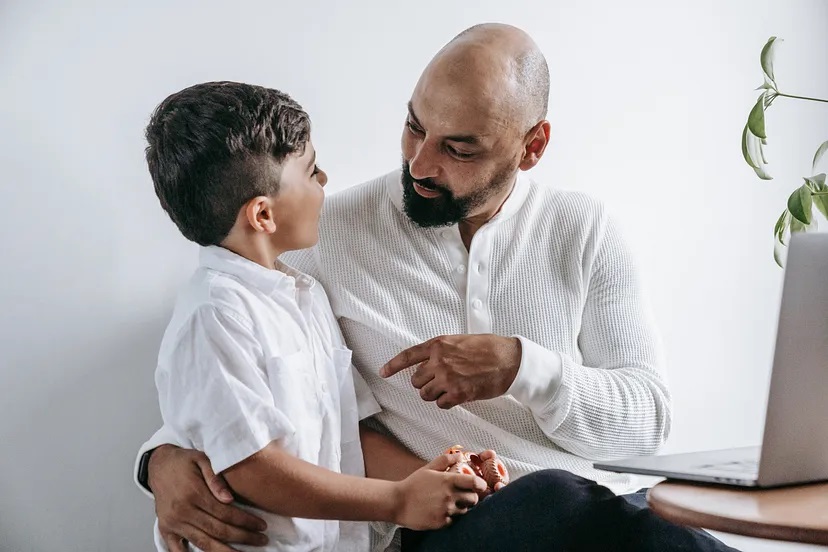Blog / 5 Ways to Encourage Empathy in Children- Learning Matters
5 Ways to Encourage Empathy in Children- Learning Matters
Published July 9, 2025 |
Fortunately, young children, by nature, are kind. They are born without any bias or conditioning. They do not discriminate and relate to all as equals. Any acts of kindness demonstrated by your child are, in fact, pure and from the heart.
But sadly, as children grow up, their environment influences their behaviour and outlook and often erodes the much-needed practice of empathy. But if instilled at an early age, this value can go a long way.
As Janet Lansbury explains,
“Our personal success as individuals and the survival of our society as a whole depend on our ability to understand and connect with others, so empathy is inarguably one of the most important traits to instill in our children.”
Let’s first start by understanding empathy.
In simpler terms, empathy is the capacity to value different perspectives, connect with another person’s emotions, and be able to walk in someone else’s shoes.
Being able to live the value of empathy doesn’t only reward your child with enhanced social-emotional skills and strong positive character but according to psychologist Daniel Goleman,
“The most effective leaders are all alike in one crucial way: They all have a high degree of what has come to be known as emotional intelligence.”
To support your child foster the value of empathy, as a parent or guardian, here are some tips that can be followed:
1. Be a role model:

Children learn best from what they see around them, hence, the first step would be modelling empathetic behaviour yourself.</
Create a culture of empathy at home — listen to what your children have to say, ask questions that help you connect with their concerns, and step into their shoes to relate to their concerns.
Show empathetic validation for their concerns like,
“I hear that you are upset about your friend not being here because you were so looking forward to your play date, would it help if we went to your favourite park for a while? “
According to Rebecca Parlakian, Senior Director of Programs at Zero
To Three, this approach of expressing compassion for their difficult feelings helps your child reciprocate the empathy for someone who might be experiencing similar feelings.
2. Create opportunities to learn:
Encourage your child to practice empathy outside their familiar surroundings by modelling compassion through your behaviour like:
“I say thank you to the server when they bring our food to express my gratitude for their service. “
Inspiring your child to proactively engage with community service or social clubs in their community can be another way for your child to learn to practice empathy in unfamiliar spaces.
According to experts at the Making Caring Common project, Harvard, to support your child in accepting different perspectives and learning how to empathise with their peers, invite your child to conversations that help them connect with their feelings like:
“I know you are upset with your friend because of the fight, but were you able to see your friend’s perspective in the scenario?”
or
“I hear that your best friend may not like you
interacting with other peers but do you feel this is a healthy behaviour for you?”
3. Discourage disrespectful behaviour:
While engaging with your child about compassion, it’s important to anticipate moments when your child might exhibit rude behaviour.
Initiate and hold conversations with your child about their feelings and how their behaviour might’ve affected others’ feelings, like:
“How do you think your teacher might have felt when you back-talked with him/her?” or
“Do you think the shouting helped the message you wanted to convey to your father? Do you feel you could’ve said it any differently?”
Help your child process their emotions and support them in seeking strategies to manage them, however, remember to hold back any sharp comments to express your disapproval of their behaviour as that may prevent any improvement in their actions.
4. Help understand different perspectives:

For the child to practice empathy effectively, it’s very important to develop an understanding and acceptance of different perspectives.
Using children’s stories could be the best way to do it, and one such popular example is the story of three pigs where the wolf is considered cruel and everyone sympathises with the pigs but have we ever looked into the wolf’s side of the story?
Jon Scieszka writes in this humorous retelling of The True Story of Three Little Pigs that the “ravenous” wolf didn’t huff and puff to blow the pigs’ houses down.
Instead, it had just stopped to borrow a cup of sugar, and owing to his horrible allergy, blew the houses down accidentally with a big and powerful sneeze.
Such techniques can help build the habit of understanding different perspectives.
5. Use effective strategies to identify feelings:

While learning to be empathetic to others, your child might need some effective strategies to address their feelings, practice self-control, and interact with others.
If the child is finding it difficult to express empathy, there might be some unresolved feelings like shame or anger blocking the compassion.
Support your child in naming the feeling that’s making it difficult for them to express sensitivity, and understanding why they are having that feeling.
If they feel overwhelmed with the emotion, you can ask them to practice self-control by stopping the thoughts, taking a deep breath through the nose, exhaling through the mouth and counting to five.
Another way of building empathy is to encourage your child to practice efficient listening skills for their peers through the “HEAR” strategy, says
Donna Wilson & Marcus Conyers for Edutopia.
Halt:
Start with freeing your mind of any internal and external engagements to give the speaker your attention.
Engage:
While you focus your thoughts on the speaker, you can also include non-verbal cues like turning your head slightly to the speaker, or nodding to express your agreement or disagreement.
Anticipate:
While you engage with the speaker’s thoughts, look forward to what the speaker has to say and express your acknowledgement to show that you are interested in listening to them further.
Moreover, the idea of learning something new will also enhance your internal motivation in the dialogue.
Replay:
Let the information shared with you settle down, and process it by replaying and dialoguing the information you have heard to understand the speaker’s point of view.
Conclusion:
Empathy is one of life’s key values that can help a child grow up into a kind and strong individual. As a parent or caretaker, it is a major responsibility to encourage this value in our children.
This can only be achieved by exhibiting empathetic behaviour and being a role model, using techniques to understand different points of view and perspectives, recognising and voicing feelings and thoughts from another person’s point of view.
Developing empathy is at the heart of being a kind and good human being- our true and innate nature at birth.






